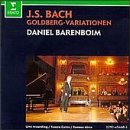|
Goldberg Variations BWV 988
Played by Daniel Barenboim
Discussions
Recording
|
N-1 |
J.S. Bach: Goldberg Variations |


|

|
|
Goldberg Variations BWV 988 |
|
Daniel Barenboim (Piano) |
|
Erato / Teldec |
Oct 1989 |
CD / TT: 79:55 |
|
Recorded live at Teatro Colón, Buenos Aires, Argentine.
Buy this album at: Amazon.com | Amazon.com |
|
Barenboim Goldbergs |
|
Bradley Lehman wrote (September 23, 2004):
< Just for clarification, "recent Barenboim endeavor" applies to his WTC Book I. His Goldbergs is from quite a few years ago. >
And soporific. Save your louis d'or to get something else. Like the ECM Schiff and the Dershavina. |
|
Charles Francis wrote (September 23, 2004):
[To Bradley Lehman] But "soporific" was the wanted affekt (see Forkel for details). |
|
Mocfujita wrote (September 23, 2004):
[To Bradley Lehman] As you said, Barenboim's performance of the Goldberg Variations was soporific. He is one of the great musicians, I know. But I don't see why he plays the Goldberg and the WTC like the way he does. Boring. with unfavorable ornaments. |
|
Bradley Lehman wrote (September 24, 2004):
[To Charles Francis] I did see Forkel for details. Forkel disagrees with your assertion. According to Forkel, the legend is: "The Count was often sickly, and then had sleepless nights. At these times Goldberg, who lived in the house with him, had to pass the night in an adjoining toom to playsomething to him when he could not sleep. The Count once said to Bach that he should like to have some clavier pieces for his Goldberg, which should be of such a soft and somewhat lively character that he might be a little cheered up by them in his sleepless nights." [New Bach Reader, p464]
Cheered up. Not put to sleep through ennui. For whatever Forkel's legend is worth, let's at least be fair to him and report it accurately instead of making up stuff. |
|
Charles Francis wrote (September 24, 2004):
[To Bradley Lehman] Thanks for the information. I'm ok with the cheerful Gould, it seems. |
|
Thomas Braatz wrote (September 24, 2004):
[To Bradley Lehman] Let's look at the original!
"Einst äusserte der Graf gegen Bach, dass er gern einige Clavierstücke für seinen Goldberg haben möchte, die so sanften und etwas muntern Charakters wären, dass er dadurch in seinen schlaflosen Nächten ein wenig aufgeheitert werden könnte. Bach glaubte, diesen Wunsch am besten durch Variationen erfüllen zu können, die er bisher, der stets gleichen Grundharmonie wegen, für eine undankbare Arbeit gehalten hatte."
["Once the Count commented to Bach that he would like to have several keyboard pieces for [his!] Goldberg, such pieces/compositions which would be so soft/gentle and of a somewhat non-depressing (the opposite of weak or sick) character so that he might be freed just a bit from his gloomy/melancholy state during his sleepless nights. Bach thought he could fulfill this {the count's} wish best of all by means of variations, the composing of which he had considered to be a thankless undertaking because of the basic harmonies which were repeated over and over again."]
Johann Nikolaus Forkel, "Über Johann Sebastian Bachs Leben, Kunst und Kunstwerke. Für patriotische Verehrer echter musikalischer Kunst," [Leipzig, 1802, pp. 51-2]
My translation is based upon possible meanings given by the DWB (The Grimm Borthers' OED)
The words which Forkel reported as coming from Bach are important: the repetitive nature of variations is something that Bach generally wished to avoid, possibily because so much effort had to be expended in creating contrasts over an otherwise 'soporific' ground bass. It does not matter that Bach eventually succeeded in creating one of the greatest sets of variations for keyboard. What is significant here is that prior to attempting to fulfill the count's wish, Bach considered the potential monotony inherent in the repetitive harmonic scheme as being appropriate for creating a state of mind conducive to sleep and not one which would continue to agitate the count into a continuous state of wakefulness from which he was trying to escape. ["munter" in one of its basic meanings can imply the opposite of drousy sleepiness, but that is not its meaning here when seen in its complete context -- how else will the statement about Bach's choice of variations for the insomniac count make sense here? It is easier simply to pass it over as something not very important for this anecdote. Notice also the qualifier "etwas" which reduces the strength of this adjective. "aufgeheitert" - to be removed from a gloomy or melancholy state does not have to mean that the count who is 'aufgeheitert' is now jumping for joy out of wakefulness, but rather that he has had the dark cloud which has surrounded him during his insomnia removed so that he can then quickly fall asleep. "sanft" gives the general volume level of the pieces desire: soft and not loud - just the way a harpsichord might sound in an adjoining room.] |
|
Donald Satz wrote (September 24, 2004):
[To Thomas Braatz] There isn't anything in the parapgraph you translated into English that goes along with your "conducive to sleep" assumption. Actually, the paragraph contradicts the assumption.
What's the point of this? I doubt that any of us want to be lulled to sleep by a performance of the work. |
|
Charles Francis wrote (September 24, 2004):
[To Donald Satz] Is another explanation for those soporific repeats? Of the performances you know, how many have all of them? |
|
Donald Satz wrote (September 24, 2004):
[To Charles Francis] I have no idea what you're talking about. |
|
Thomas Braatz wrote (September 24, 2004):
[To Donald Satz] David Schulenberg on how Bach probably wanted to have the Goldberg Variations performed: [p. 322 of “The Keyboard Music of J. S. Bach” {Schirmer, 1992}]
>>Bach himself would have considered the question of cyclic form somewhat differently from many later composers [and probably many later performers as well!], as the work was presumably not intended for complete public performance. Few purchasers of the original print of the Goldberg Variations would have regarded it primarily as something to be used for playing through from cover to cover; Goldberg’s supposed performances for Keyserlingk would have ended as soon as the latter fell asleep.<<
Sounds like the Goldberg Variations would have been effective in accomplishing Bach's goal just as Forkel had reported it. |
|
Donald Satz wrote (September 24, 2004):
[To Thomas Braatz] Do you think the work should be played with top priority on comfort and warmth? |
|
Charles Francis wrote (September 24, 2004):
Donald Satz wrote:
< I have no idea what you're talking about. >
If the Goldberg's are performed as Bach wrote them, i.e., respecting all the repeat markings, they need two CDs. Most, if not all, performers ignore some of repeat markings (or all of them). |
|
Donald Satz wrote (September 24, 2004):
[To Charles Francis] I think that in recordings from the modern-era, performers observe most of the repeats. I did listen to a new version from pianist Haskell Small on 4Tay where the only repeats played are from the 30th variaition. Anyone familiar with this recording that also has Small's 25 Preludes. |
|
John Pike wrote (September 24, 2004):
Donald Satz wrote:
< Do you think the work should be played with top priority on comfort and warmth? >
I agree with all Don's comments in this and previous e mails but this thread is making me very soporific...far more so than any performance of the Goldberg's I know. |
|
Bradley Lehman wrote (September 24, 2004):
[To John Pike] Yes. Furthermore, Dr Schulenberg himself doesn't advocate deliberately monotonous performances of Bach; it's only a destructive misquotation from and misrepresentation of his work (below) that makes it appear so. [Playing excerpts, and playing boringly, are not at althe same thing!] |
| |
|
B'boim Goldbergs |
|
Bradley Lehman wrote (September 28, 2004):
John Pike wrote: < I wish we could get away from all the bashing of top professionals offering their interpretation of these glorious works. By all means say you do or don't like a particular interpretation but end it there. Much of the the rest of the thread has been extremely irritating, with further attempts to discredit professionals and experts. I particularly enjoyed Brad's account of the joy his young daughter got from listening to various lively interpretations. I think there is much to be said for very young childrens' ability to discern various qualities in performance. They react in an instinctive way, free of all the trash that so often comes into the work of professional critics. >
While driving to pick her up yesterday, and then finishing up while I did the dishes, I (we) listened through Barenboim's Goldbergs--the 1989 Erato recording of a live concert in Buenos Aires. My daughter acted completely disinterested in the whole thing.
I liked the performance more than I had remembered liking it a couple of years ago: some very good piano playing in there, while as a whole I still felt that the performance seemed somewhat aimless. Goes along for a while, and then it suddenly surges much louder or has shifted-around balances among the voices, or otherwise variety that seems to be there merely for the sake of giving it some variety, intuitively from moment to moment. All the repeats, but no ornamentation other than occasionally delivering the same signed ornaments at a different speed the second time around; variety in that performance came more from changing the volume and/or articulation on the repeats, or bringing out one of the voices much more loudly than before.
I saw later in the booklet notes that Barenboim said he was shooting for an effect of "orchestration" of the whole piece, since he believes the piano is inherently bland and neutral. OK, yeah, that comes across. I still felt it all came across as rather arbitrary, in the big picture, to get all the way through the 80 minutes. And then, thinking back on it, I could hardly remember any of the moments in particular that had seemed momentarily interesting. All very nice piano playing as it goes along, but in retrospect, nothing that seemed especially insightful other than shifting the details around for their own sake, randomly, as it went along. Safe tempos, phrases rounded off, good tone. Pleasant background music for driving or for doing dishes. I expect more than that: more than an 80 minutes of pretty sounds. Doesn't have to take 80 minutes. A captivating intensity can happen in 2 minutes. Barenboim's playing of the Beethoven concertos with Klemperer has some gripping moments like that. So do his records with Jackie. I wished to hear more of that in his Bach. His own standards of excellent piano-playing have set up that expectation, and within that I find his Bach disappointing. Merely nice. He can play better than that. He can PLAY better than that. And watch the video of him conducting Jackie in the Elgar concerto, from memory: he's an intense musician. Why isn't it in his Bach? |
|
Uri Golomb wrote (September 28, 2004):
Bradley Lehman wrote:
< His own standards of excellent piano-playing have set up that expectation, and within that I find his Bach disappointing. Merely nice. He can play better than that. He can PLAY better than that. And watch the video of him conducting Jackie in the Elgar concerto, from memory: he's an intense musician. Why isn't it in his Bach? >
If I might hazard a guess (and it is only a guess -- I haven't even read his views of Bach), maybe believes that Bach is a less "expressive", more "objective" composer. That's certainly the reason why other musicians treated Bach's music (and/or other BAroque works) less expressively than later repertoires.
I haven't heard his Goldbergs in a long time. I have great affection for his EMI cycle of the Mozart concerti with the English Chamber Orchestra, and for his recordings of Beethoven's chamber music with Zuckerman and Du pre (and, more recently, his Beethoven symphonies with the Staatskapelle Berlin). I don't always agree with everything he and his colleagues do, but there's a clear sense of spontaneity and risk-taking.
Paul McCreesh said, in a recent interview (Goldberg 29, p. 48 -- this hasn't been posted on the web yet, but it probably will be): "It seems to me that there are not enough people who are really passionate or musical enough in terms of the way they perform. I know it's a matter of taste, but if you ask me about the people I most like, they are often people I most dislike, if you know what I mean. I have such respect for those with passion and conviction, even if what they do is diametrically opposed to how I feel about the music". I think I know what he means: I feel like that almost all the way through Mengleberg's Matthaus-Passion (BWV 244), and in certain moments of Barenboim's Mozart and Beethoven (or, for that matter, Harnoncourt in just about everything). Except that, in both Harnonoucrt and Barenboim, there are long stretches where I enjoy both their daring and conviction and their acutal interpretation. |
|
John Pike wrote (September 28, 2004):
[To Uri Golomb] "The best lack all conviction and the worst are full of passionate intensity" or something like that.
WB Yeats |
|
Bradley Lehman wrote (September 28, 2004):
[To John Pike] "We're very lucky in the band in that we have two visionaries, David and Nigel, they're like poets, like Shelley and Byron. They're two distinct types of visionaries, it's like fire and ice, basically. I feel my role in the band is to be somewhere in the middle of that, kind of like lukewarm water." - Derek Smalls, bass player of Spinal Tap: http://us.imdb.com/title/tt0088258/quotes |
|
Uri Golomb wrote (September 28, 2004):
[To John Pike] I wonder if he was talking about the best and worst artists. In any case, while I can partly agree with the second part of the statement (some of the worst atrocities in history -- and, yes, also some of the worst artworks and performances... -- were motivated by passionate intensity), I absolutely disagree with the first part. "The best lack all conviction"?!? I don't see how one can excel in anything without conviction and commitment.
In art, I think you can reverse Yeats' statement. You come up with: "The worst lack all conviction and the best are full of passionate intensity". That, too, is a generalisation, maybe even a gross over-simplification; but it closer to the truth than its opposite. |
|
John Pike wrote (September 29, 2004):
[To Uri Golomb] To put the quotation in its context may help:John The Second Coming -- W. B. Yeats
Turning and turning in the widening gyre
The falcon cannot hear the falconer;
Things fall apart; the centre cannot hold;
Mere anarchy is loosed upon the world,
The blood-dimmed tide is loosed, and everywhere
The ceremony of innocence is drowned;
The best lack all convictions, while the worst
Are full of passionate intensity.
Surely some revelation is at hand;
Surely the Second Coming is at hand.
The Second Coming! Hardly are those words out
When a vast image out of Spiritus Mundi
Troubles my sight: somewhere in sands of the desert
A shape with lion body and the head of a man,
A gaze blank and pitiless as the sun,
Is moving its slow thighs, while all about it
Reel shadows of the indignant desert birds.
The darkness drops again; but now I know
That twenty centuries of stony sleep
Were vexed to nightmare by a rocking cradle,
And what rough beast, its hour come round at last,
Slouches towards Bethlehem to be born? |
| |
|